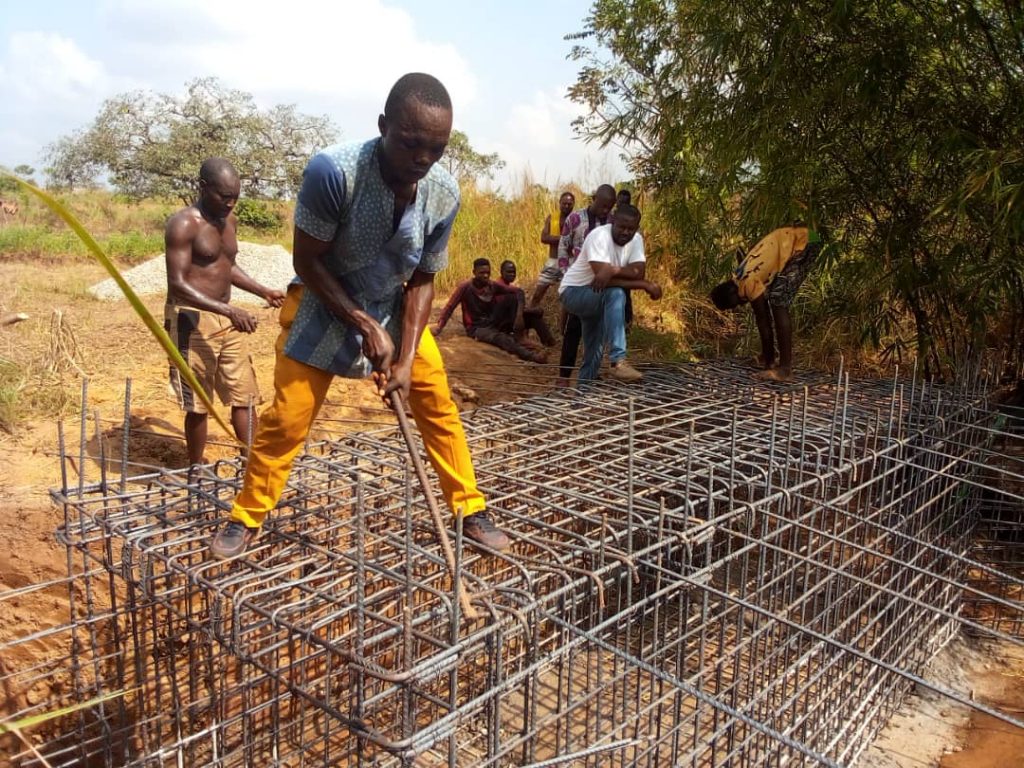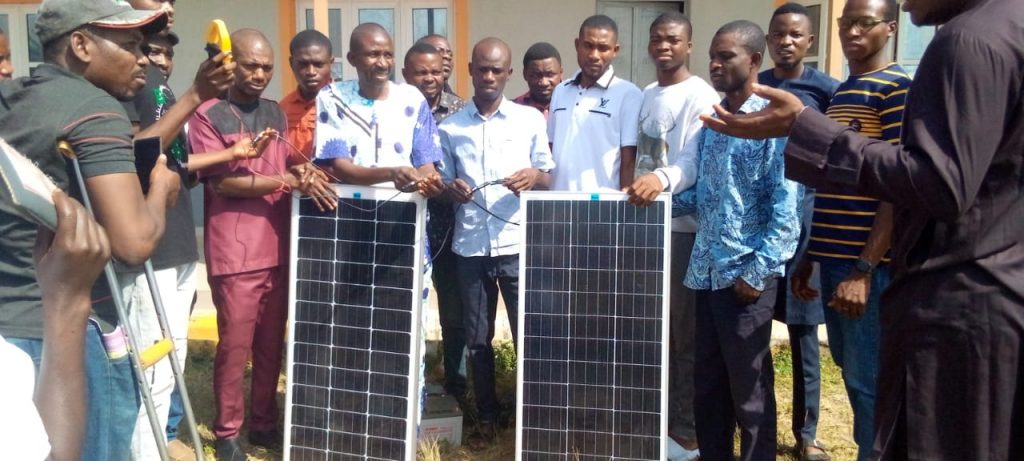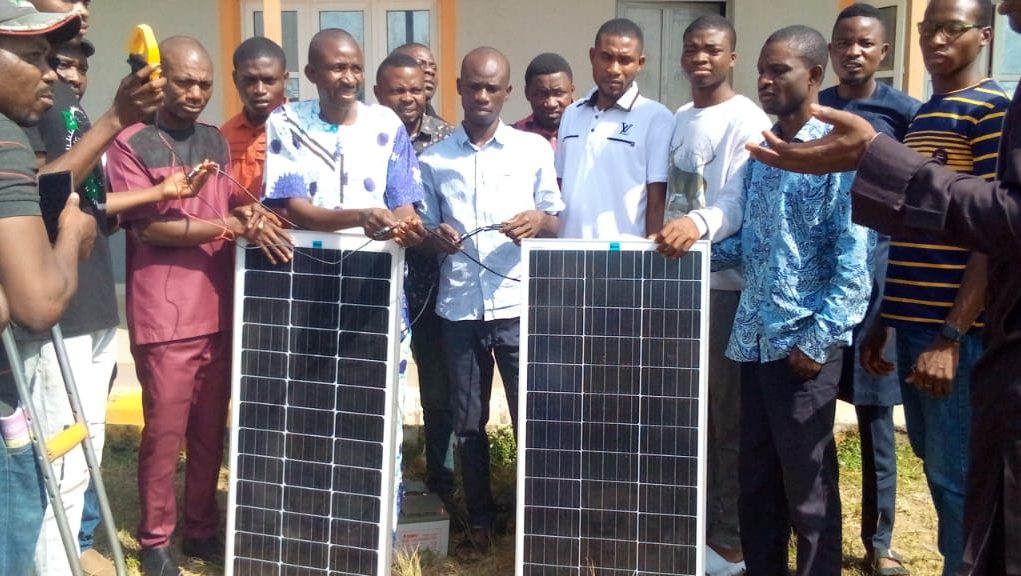Like many developing countries in Africa and other part of the world, the challenge of unemployment is very critical in Nigeria. With over 150 million people, the government of Nigeria struggles to provide job opportunities for its teeming unemployed persons, as youths make up the larger number of its population.
While many government agencies in Nigeria play their part in the country’s all important job creation responsibility, a particular agency, the National Directorate of Employment (NDE), has a statutory mandate to do everything possible to provide jobs.
To this effect, the NDE through the ingenious efforts of its well trained personnel, came up with a result oriented job provision department called Special Public Works.
The Special Public Works (SPW) department of the National Directorate of Employment (NDE) is one of the four core programmes of the Directorate. The Director General, Mallam Abubakar Nuhu Fikpo, explains.
“It is designed to address the problem of unemployment among youths. The programme according to NDE, is designed to achieve its purpose through the provision of transient jobs and technical skills acquisition training that will promote skilled, semi-skilled and professional manpower/labour for self-employment and self-reliance.” He added.

Apparently serving as a part of the vehicle through which NDE is currently delivering its mandate of employment provision for Nigeria’s teeming unemployed persons, the SPW Schemes components are: Graduate Attachment Programme (GAP), Graduate Special Training Programme (GSTP), Environmental Beautification Training Scheme (EBTS), Graduate Coaching Scheme (GCS), Solar Energy Training Scheme (SETS) Artisans in Collaborative Construction Employment Scheme (ACCES), Enviroprenuership Development Scheme (EDS), Labour Based and Infrastructural Development Scheme (CDS), Community Based Business Training Scheme (CBBTS). This is according to NDE official reports.
Obviously with the full support of President Muhammadu Buhari, under supervision of the Minister of State for Labour and Employment, Mr Festus Keyamo SAN, and implementing directorship of the NDE’s Director-General, Mallam Abubakar Nuhu Fikpo, the SPW schemes have become an effective job creation tool and a decent job module. And not surprisingly, the schemes have been judged one of the most sustainable job provision solutions to arrest the scary, swelling unemployment rate in Nigeria and many other countries, especially in Africa.
Although the National Directorate of Employment was recently described as the hub of blue collar jobs in Nigeria by the Minister of State, Labour and Employment, Festus Keyamo(SAN), the relentless trajectory of the Directorate in providing self and wage employment for millions of Nigerians, indicates the NDE is ingeniously proffering solutions to the country’s unemployment challenge. According to the DG, Mallam Fikpo, the result-oriented job provision schemes and continued support of the President and its Supervising Minister, NDE is geared to crash the high rate of unemployment menace in Nigeria.
Whereas testimonies of many beneficiaries of the schemes and programmes, attest to the fact that SPW is a success story that must to be sustained in the efforts to combat unemployment and its ripple effects, official records have also shown that the Directorate, through the Special Public Works schemes and other job creation programmes has provided about 4,261,308 self employments and wage employments within a short period of time. The figures further show that about 2,545,102 are male while 1,716,206 are female beneficiaries, across the 36 states of the Federation and Federal Capital Territory Abuja.

Recently, the NDE DG, Mallam Abubakar Nuhu Fikpo, shade more light on the nine different SPW schemes and explained what Nigerians need to know about them. They are; Graduate Attachment Programme (GAP). “The scheme is designed to provide transient employment to unemployed graduates of tertiary institutions. The unemployed graduates are recruited and attached to willing cooperate organizations for a period of three (3) to twelve (12) months to gain needed practical experience that would facilitate their employability by the organization on or before the expiration of the internship period.”
Environmental Beautification Training Scheme (EBTS). “This scheme is for the training of unemployed persons in Soft/Hard Landscaping and Plaster of Paris (POP) for a period of three months. Participants are attached to master trainers to ensure that they acquire professional skills in Environmental Beautification, Sanitation and protection/control of the environment. At the end of the training period, the participants are empowered with working tools and equipment to start their own business. The scheme is targeted at school leavers, the unschooled and any other interested persons, graduates inclusive.”
Graduate Coaching Scheme (GCS). “GCS creates transient both and permanent/sustainable employment for the unemployed graduates of tertiary institutions especially those with educational training(professional teachers) background. The graduates are recruited as instructors to prepare students who may be deficient in some subjects for various external examinations such as JAMB, WAEC/NECO, NABTEB, GCE etc. for a period of 3 months. This will enable the students make up for their deficiency in various subjects and also qualify them for admission into higher institutions of learning.

Solar Energy Training Scheme (SETS) “The scheme is one of the Renewable Energy Training schemes employed by the Special Public Works Department for employment generation. Under the scheme, unemployed graduates of tertiary institutions (especially those with engineering/technical knowledge) are trained to acquire skills in solar energy design, procurement, installation and maintenance of solar facilities. The Scheme is targeted at graduates of training institutions and other interested persons with technical background.”
Graduate Special Training Programme (GSTP) “GSTP is for graduates of tertiary institutions. It involves a 2-week digital skills training on specialized applications relevant to skills needed in specific careers or professional practices. The skill sets include; Autodesk, project management, hardware installations e.g. Dish and Satellite installations, V–Sat and internet installations and Networking. At the end of thetraining, participants are attached to well managed small and medium enterprises for a period of 3–6 months to develop competence in the learnt skills.
“The training prepares participants to possess skills relevant to meet demands for the job, function effectively and succeed in the technology-based millennium workplace. Competence in these skills confers on the holder a competitive edge in securing employment and/or starting a business.”
Artisans in Collaborative Construction Employment Scheme (ACCES) ACCES is a scheme designed to collaborate with relevant stakeholders and organizations in the construction sector where standards of various professions are imbibed. The scheme is also targeted at imparting industry-led competency skills as well as providing required certification to artisans under appropriate professional bodies.”
Enviroprenuership Development Scheme (EDS) “The scheme is designed to combat unemployment among youths by bringing market principles to resolve environmental problems. It is aimed at improving environmental sustainability and social contribution to the society. Business initiatives are applied to turn waste into wealth to improve the standard of living of both the end consumers and the participants.”
Labour Based and Infrastructural Development Scheme (CDS). “The Labour Based and Infrastructural Development Scheme is designed to facilitate the engagement and training categories of unemployed persons in the construction, rehabilitation, and maintenance of varieties of infrastructure. This is archived by adopting the labour based method of infrastructural development, thus making optimal use of labour supported by compactable light equipment.
The scheme offers participants the opportunity to develop their skills and work experience. Additional job creation, wealth creation, and infrastructure development is archived within the benefiting communities.”
Community Based Business Training Scheme (CBBTS) “This scheme is designed to train unemployed persons in businesses that have comparative advantage in selected communities. It focuses on social, structural and physical environmental inequalities through active involvement of community members, organizational representatives and employers of labour.”
“Partners/members of community-based businesses contribute their expertise to enhance understanding of a given business phenomenon and to translate knowledge into action. Community-based businesses are socially and environmentally responsible where they are driven by the desire to re-invest in the community as a way to strengthen it, where collaboration, partnership, advocacy and co- creation are top values.”
Story by Christian Appolos






























